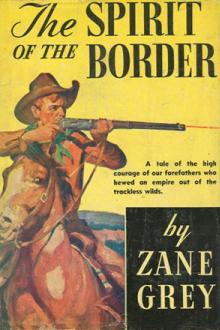The U. P. Trail, Zane Grey [robert munsch read aloud .txt] 📗

- Author: Zane Grey
Book online «The U. P. Trail, Zane Grey [robert munsch read aloud .txt] 📗». Author Zane Grey
“Allie, these men are all bad,” said Durade. “You must avoid them when my back’s turned. I cannot run my place without them, so I am compelled to endure much.”
Allie’s attendant came in with her supper and she went to her room.
Thus began Allie Lee’s life as an unwilling and innocent accomplice of Durade in his retrogression from the status of a gambler to that of a criminal. In California he had played the game, diamond cut diamond. But he had broken. His hope, spirit, luck, nerve were gone. The bottle and Benton had almost destroyed his skill at professional gambling.
The days passed swiftly. Every afternoon Durade introduced a new company to his private den. Few ever came twice. In this there was a grain of hope, for if all the men in Benton, or out on the road, could only pass through Durade’s hall, the time would come when she would meet Neale or Larry. She lived for that. She was constantly on the lookout for a man she could trust with her story. Honest-faced laborers were not wanting in the stream of visitors Durade ushered into her presence, but either they were drunk or obsessed by gambling, or she found no opportunity to make her appeal.
These afternoons grew to be hideous for Allie. She had been subjected to every possible attention, annoyance, indignity, and insult, outside of direct violence. She could only shut her eyes and ears and lips. Fresno found many opportunities to approach her, sometimes in Durade’s presence, the gambler being blind to all but the cards and gold. At such times Allie wished she was sightless and deaf and feelingless. But after she was safely in her room again she told herself nothing had happened. She was still the same as she had always been. And sleep obliterated quickly what she had suffered. Every day was one nearer to that fateful and approaching moment. And when that moment did come what would all this horror amount to? It would fade—be as nothing. She would not let words and eyes harm her. They were not tangible—they had no substance for her. They made her sick with rage and revolt at the moment, but they had no power, no taint, no endurance. They were evil passing winds.
As she saw Durade’s retrogression, so she saw the changes in all about him. His winnings were large and his strange passion for play increased with them. The free gold that enriched Fresno and Mull and Andy only augmented their native ferocity. There were also Durade’s other helpers—Black, his swarthy doorkeeper, a pallid fellow called Dayss, who always glanced behind him, and Grist, a short, lame, bullet-headed, silent man—all of them under the spell of the green cloth.
With Durade’s success had come the craze for bigger stakes, and these could only be played for with other gamblers. So the black-frocked, cold-faced sharps became frequent visitors at Durade’s. Jones, the professional, won on that second visit—a fatal winning for him. Allie saw the giant Fresno suddenly fling himself upon Jones and bear him to the floor. Then Allie fled to her room. But she heard curses—a shot—a groan—Durade’s loud voice proclaiming that the gambler had cheated—and then the scraping of a heavy body being dragged out.
This murder horrified Allie, yet sharpened her senses. Providence had protected her. Durade had grown rich—wild—vain—mad to pit himself against the coolest and most skilful gamblers in Benton—and therefore his end was imminent. Allie lay in the dark, listening to Benton’s strange wailing roar, sad, yet hideous, and out of what she had seen and heard, and from the mournful message on the night wind, she realized how closely associated were gold and evil and men, and how inevitably they must lead to lawlessness and to bloodshed and to death.
23
Neale conceived an idea that he was in line for the long-looked-for promotion. Neither the chief nor Baxter gave any suggestion of a hint of such possibility, but more and more, as the work rapidly progressed, Neale had been intrusted with important inspections.
Long since he had discovered his talent for difficult engineering problems, and with experience had come confidence in his powers. He had been sent from place to place, in each case with favorable results. General Lodge consulted him, Baxter relied upon him, the young engineers learned from him. And when Baxter and his assistants were sent on ahead into the hills Neale had an enormous amount of work on his hands. Still he usually managed to get back to Benton at night.
Whereupon he became a seeker, a searcher; he believed there was not a tent or a hut or a store or a hall in the town that he had not visited. But he found no clue of Allie; he never encountered the well-remembered face of the bandit Fresno. He saw more than one Spaniard and many Mexicans, not one of whom could have been the gambler Durade.
But Benton was too full, too changeful, too secret to be thoroughly searched in little time. Neale bore his burden, although it grew heavier each day. And his growing work on the railroad was his salvation.
One morning he went to the telegraph station, expecting orders from General Lodge. He found the chief’s special train at the station, headed east.
“Neale, I’m off for Omaha,” said Lodge. “Big pow-wow. The directors roaring again!”
“What about?” queried Neale, always alive to interest of that nature.
“Cost of the construction. What else? Neale, there are two kinds of men building the U. P. R.—men who see the meaning of the great work, and the men who see only the gold in it.”
“And they conflict!... That’s what you mean?”
“Exactly. We’ve been years on the job now, and the nearer the meeting of rails from west to east the harder become our problems. Henney is played out, Boone is ill, Baxter won’t last much longer. If I were not an old soldier, I would be done up now.”
“Chief, I can see only success,” replied Neale, with spirit.
“Assuredly. We see with the same eyes,” said General Lodge, smiling. “Neale, I’ve a job for you that will make you gray-headed.”
“Hardly that,” returned Neale, laughing.
“Do you remember the survey we made out here in the hills for Number Ten Bridge? Made over two years ago.”
“I’m not likely to forget it.”
“Well, the rails are within twenty miles of Number Ten. They’ll be there presently—and no piers to cross on.”
“How’s that?”
“I don’t know. The report came in only last night. It’s a queer document. Here it is. Study it at your leisure.... It seems a big force of men have been working there for months. Piers have been put in—only to sink.”
“Sink!” ejaculated Neale. “WHEW! That’s a stumper!... Chief, the survey is mine. I’ll never forget how I worked on it.”
“Could you have made a mistake?”
“Of course,” replied Neale, readily. “But I’d never believe that unless I





Comments (0)